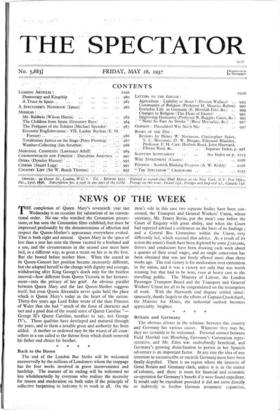Back to the Buses The end of the London Bus
Strike will be welcomed unreservedly by the millions of Londoners whom the stoppage has for four weeks involved in grave inconvenience and hardship. The manner of its ending will be welcomed no less wholeheartedly by everyone who realises the necessity for reason and moderation on bah sides. if_ the _principle of collective bargaining in industry is' to work at all. On the men's side- in this case_ two separate bodies have been con- cerned, cerned, the Transport and _General Workers' Union, whose secretary, Mr. Ernest Beyin, put the men's case before the Court of Enquiry with great ability, and when the Court had reported advised a settlement on the basis of its findings ; and a Central Bus Committee within the Union, very differently led, which rejected that advice. As a result of its action the union's funds have been depleted by some L120,000, drivers and conductors have been drawing each week about a quarter of their usual wages, and no single concession has been obtained that was not freely offered more than three weeks ago. The real victory is for moderation over extremism in the union, and it was a victory not only that was worth winning but that had to be won, even at heavy cost to the travelling public. The Ministry of Labour, the London Passenger Transport Board and the Transport and General Workers' Union are all to be congratulated on the resumption of work. With the Hanvorth coal dispute settled simul- taneously, thanks largely to the efforts of Captain Crookshank, the Minister for Mines, the industrial outlook becomes appreciably brighter.
* *






































